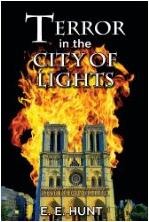Terror in the City of Lights
 Traveling to Paris on vacation two New York Federal agents are directed by
their supervisor to assist four anti-terror fighters in Paris, three
American and one a female Muslim, all labeled by a Paris newspaper as
four modern musketeers. They are being hunted by an Islamic Algerian
Salafist who seeks revenge for his brother's death hat occurred in a
shootout in the Casbah in Algiers. The four are joined by French special
agent Jules Crouseau who although considered awkward 'gets his man' in
his own unusual way.
Traveling to Paris on vacation two New York Federal agents are directed by
their supervisor to assist four anti-terror fighters in Paris, three
American and one a female Muslim, all labeled by a Paris newspaper as
four modern musketeers. They are being hunted by an Islamic Algerian
Salafist who seeks revenge for his brother's death hat occurred in a
shootout in the Casbah in Algiers. The four are joined by French special
agent Jules Crouseau who although considered awkward 'gets his man' in
his own unusual way.
Not satisfied with vengeance against the musketeers alone the Algerian terrorist also wants to destroy monuments in Paris. In the process he and his henchmen try to shoot the terror fighters in a popular Parisian restaurant, kill them in a car bomb on he beltway around Paris, and then finally destroy them in the process of blowing up both the cathedral of Notre Dame and the famed Hotel de Dieu on the Ile de St. Louis.
The plot keeps you riveted as you trace the fanatical Islamist who has no conscience about murdering innocents for the sake of his demented religious viewpoint...
ISBN: 978-0-9896690-0-9 Paperback
ISBN: 978-0-9896690-1-6 Hardcover
Author's Comments
In my two earlier books Paris Under Siege and Paris on Fire,
I introduced a character, Aboud Ali Quadir, who, unlike most Muslims, is
an example of a radical Islamic terrorist. I contrasted him with Fatima
Yousseff, who as a devout Muslim was just the opposite: a moderate,
fair-minded, and decent human being. Terror in the City of Lights
continues to reveal the difference between uncompromising ideologues and
normal Muslims.
In most cases religion helps people fight the evil within themselves but
not in irrational fanatics who claim the know the only truth and project
their own inadequacies upon others in an effort to control them. In my
opinion, journalist and news commentator David Brooks aptly expressed
opposition to ideological extremism in the October 26, 2012 editorial
page of the New York Times:
Moderation is ... a distinct ethical disposition. Just as the moderate
suspects
imbalance in a country, so she (he) suspects it in herself. She distrusts
passionate
intensity and bold simplicity and admires self restraint, intellectual
openness
and equipoise.
He could be describing my heroine Fatima Yousseff.
Blind fanaticism is the bane of our modern existence, the lure of a false
security in changing times. Individuals who murder innocents in the name
of faith know no syntheses, on one extreme; they cling to a thoughtless
righteousness that is not godly but it's very opposite, demonic.
Such was also the case of a man I described in my first book, Aboud Ali
Qadir, along with many others that followed his fanatical way.
While he was a radical Islamist, he knew no compassion and was ruled
totally by a hellish iniquity.
Many of all faiths in history have done the same, but one who followed
About Ali Qadir in his footsteps was a fervid admirer, Assad Ghalib.
This book, Terror in the City of Lights, forms a trilogy about
Paris, France, and Muslims.
The antagonist, Assad Ghabib, is an even worse enforcer of radical
Islamism, who know no limits to implementing his twisted vision, no
synthesis between his view and those who oppose him.
In contrast to Assad's cruel extremism, it is fit to recall the words of
the Biblical prophet Micah: "And what does the Lord require of you? to
act justly, and to love mercy and to walk humbly with your God."
Please see my talk to my local chapter of the
Alliance Francaise
on the book...